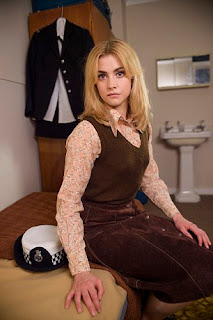This article was originally published in The Dundee Courier on 18 March 2017.
SMILE! THE NATION’S
FAMILY ALBUM: Thursday,
BBC Four
MEET THE LORDS: Monday, BBC Two
In
People Take Pictures of Each Other,
the closing track from The Kinks’ classic Village
Green Preservation Society album, Ray Davies strikes a typically ambiguous
pose on the subject of sentimental family snapshots.
“People take pictures of the summer/Just in
case someone thought they had missed it/Just to prove that they really
existed.”
The
makers of SMILE! THE NATION’S FAMILY
ALBUM missed a trick by neglecting to include Davies’ elegy on the
soundtrack, as it neatly encapsulates the bittersweet theme of this warm, poignant
documentary.
An
engaging piece of social history viewed through the lens of ordinary British
families, it examined our deep emotional need – our anxious desperation, some
might argue – to freeze treasured memories in time. From cradle to grave, we
document our lives as a way of creating narratives which, while not necessarily
false as such, tend to favour happier moments.
Contributors
included a couple who’ve amassed 20,000 images of their lives together over the
last fifty years, plus a proud father who snapped a portrait of his son every
day from the moment he was born until his 21st birthday. Having
attracted 6.5 million views on YouTube, they’ve vowed to continue their
obsessive project by each taking a daily selfie for the rest of their lives.
Despite
its celebratory surface, the programme couldn’t disguise the nagging undercurrent
of sadness one sometimes gets from revisiting more innocent, carefree times.
That Proustian rush of nostalgia is a double-edged sword.
There’s
something uniquely evocative about the sunshine captured in faded Polaroid
snapshots, especially when it beams upon loved ones who’ve since passed away.
These images trigger powerful memories, which often help families to deal with
personal loss.
My
only issue with this otherwise charming programme was its unquestioningly positive
assessment of our modern digital age, in which amateur photographers seemingly
never stop sharing fragments of their lives online.
While
the immediacy of smartphone technology has its benefits, it stops people from
living in the moment – put down your phones and absorb your surroundings! -
while encouraging tedious narcissists to wallow in the mistaken belief that
every detail of their existence is profoundly interesting.
What’s
the point of a life defined, not by experience and memory, but by the number of
‘likes’ it received on Instagram and FaceBook?
As
Davies’ warbled presciently in 1968: “Don’t
show me no more, please…”
The
final episode of MEET THE LORDS, an
observational documentary offering unprecedented behind-the-scenes access to our
hallowed gravy train of unelected peers, reminded me that Black Rod has the
sweetest gig in Westminster.
He’s
only really called into service – and I use that term loosely – during the
state opening of Parliament. So what does this liquorice-legged layabout do for
the rest of the year?
If
the aim of this series was to cement the dispiriting image of Britain as an
absurd nation governed by privileged clowns in liveried robes – they look like desiccated
Time Lords - then it was an unqualified success.
The
failure of the House to reform itself from within was laughably exposed when
the outgoing Lord Speaker abandoned her investigation into outrageous expenses
claims, as she felt her findings would cause an embarrassing scandal. This is a
woman who, during her five years in office, spent £4,000 of taxpayers’ money on
flowers for her office.
Strange,
isn’t it, that these inveterate scroungers – Britain’s worst by far – are never
held to account in the benefits-bashing pages of The Daily Mail?













